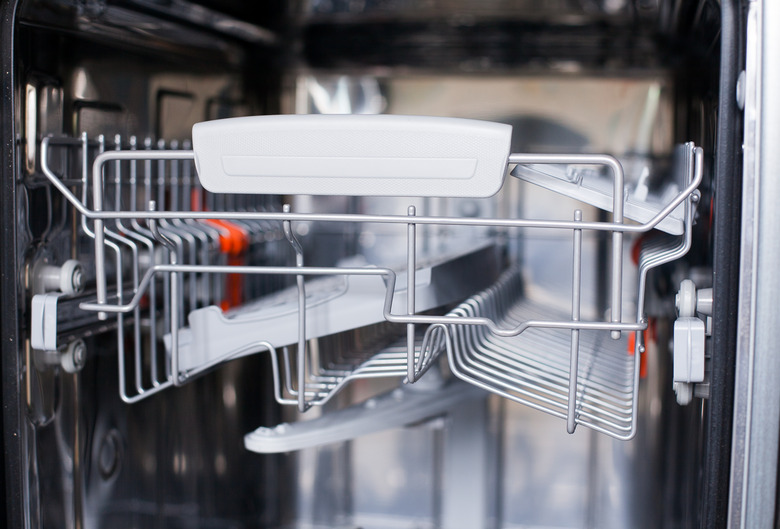Why Is Stuff Turning Orange In My Dishwasher?
People get complacent about dishwashers and clothes washers because they're appliances that clean things, so the appliance must be clean too — right? But, after a while, a funky aroma or an orange film in the dishwasher perplexes them. These orange and odorous afflictions are caused by several culprits, each with a variety of solutions.
Different Dishes, Different Reactions
Different Dishes, Different Reactions
If dishes are turning orange, the dishes themselves can be the issue, thanks to weak glazing or no glaze at all. Plastic dishes and melamine are highly susceptible to being tinted by pigments in food. Some dishes are simply better off hand-washed.
Sometimes food is harder on these dishes too. If you've made a habit of reheating spaghetti and tomato sauce in plastic containers in the microwave, you've seen the impact tomatoes have. Tomato sauces are notorious for causing dish stains, as noted by GE Appliances, particularly if there's a delay between stacking them in the dishwasher and running a cycle.
Dreaded Dishwasher Gunk
Dreaded Dishwasher Gunk
Further to the tomato sauce conundrum is gunk in general, especially if it has orange or red pigment. If you're running into problems with stained interiors or dishes getting tinted, you may have to just be more vigilant with dishes before they're put into the machine. Don't get too vigilant, though, because dishes should have some residue for the dishwasher to work properly, especially with more modern machines. But if you are a fan of pasta sauces and other tomato-based foods, those are the dishes you want to rinse before adding to the machine.
For many issues, adding 3 to 4 ounces of citric acid to the detergent cup and running an empty dishwasher on the normal cycle, followed by another empty machine with your regular detergent on a normal cycle, will alleviate some of the staining. But tomato-type stains will not respond to this, and bleach is not advised, but rest assured that this tomato staining will fade with time. And always pay attention to the drain area in the dishwasher; clean up debris regularly and run an empty cycle now and then to keep the machine happy. Regularly running a normal hot cycle with a dishwasher-safe bowl of white vinegar sitting on the top rack will do wonders to cut grease, remove some stains and nix odors.
Hard and Mineral Water Sources
Hard and Mineral Water Sources
Water comes with naturally occurring minerals in it, and even if fluoride or chlorine is present, it may still be hard water or contain iron. Well water is notorious for having more minerals, which is not necessarily bad, healthwise, but it can do a number on tub walls, dishwashers and even your dishes.
Typically, this will be more of a brownish stain than red or orange. Some dishwashers have a hard water feature that softens water before it's used in a cycle, while many homeowners attach a softener filter at the water source, and others just turn to specific detergents to soften water and remove residue. These detergents help keep machines clean inside by using sodium-based ingredients like sodium citrate and sodium carbonate.
Orange Buildup in Dishwasher
Orange Buildup in Dishwasher
Biofilm is that orange coat you can get in bathrooms, and it's also common in dishwashers. It's caused by Serratia marcescens, a bacteria that has what's called an "adhesive cell matrix," which means it thrives as a colony and sticks together, so it appears as pink or orange slime plaguing your toilet, tub and dishwasher. Unfortunately, it's persistent and hard to eliminate.
These bacteria love fatty residue — so the grease that gets into your dishwasher and food substances left behind help it thrive. It's generally not harmful, but immune-compromised people and kids can be susceptible to infections, so don't ignore it. It needs scouring and disinfecting, but don't use bleach, as it can damage your dishwasher.
